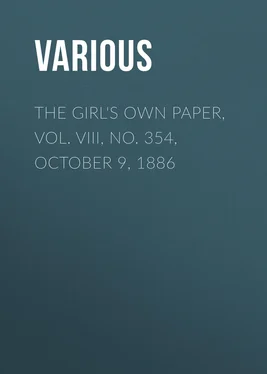Various - The Girl's Own Paper, Vol. VIII, No. 354, October 9, 1886
Здесь есть возможность читать онлайн «Various - The Girl's Own Paper, Vol. VIII, No. 354, October 9, 1886» — ознакомительный отрывок электронной книги совершенно бесплатно, а после прочтения отрывка купить полную версию. В некоторых случаях можно слушать аудио, скачать через торрент в формате fb2 и присутствует краткое содержание. Издательство: Иностранный паблик, Жанр: foreign_children, periodic, foreign_antique, foreign_prose, на английском языке. Описание произведения, (предисловие) а так же отзывы посетителей доступны на портале библиотеки ЛибКат.
- Название:The Girl's Own Paper, Vol. VIII, No. 354, October 9, 1886
- Автор:
- Издательство:Иностранный паблик
- Жанр:
- Год:неизвестен
- ISBN:нет данных
- Рейтинг книги:4 / 5. Голосов: 1
-
Избранное:Добавить в избранное
- Отзывы:
-
Ваша оценка:
- 80
- 1
- 2
- 3
- 4
- 5
The Girl's Own Paper, Vol. VIII, No. 354, October 9, 1886: краткое содержание, описание и аннотация
Предлагаем к чтению аннотацию, описание, краткое содержание или предисловие (зависит от того, что написал сам автор книги «The Girl's Own Paper, Vol. VIII, No. 354, October 9, 1886»). Если вы не нашли необходимую информацию о книге — напишите в комментариях, мы постараемся отыскать её.
The Girl's Own Paper, Vol. VIII, No. 354, October 9, 1886 — читать онлайн ознакомительный отрывок
Ниже представлен текст книги, разбитый по страницам. Система сохранения места последней прочитанной страницы, позволяет с удобством читать онлайн бесплатно книгу «The Girl's Own Paper, Vol. VIII, No. 354, October 9, 1886», без необходимости каждый раз заново искать на чём Вы остановились. Поставьте закладку, и сможете в любой момент перейти на страницу, на которой закончили чтение.
Интервал:
Закладка:
Various
The Girl's Own Paper, Vol. VIII, No. 354, October 9, 1886
CALLED AWAY
In the heart of the heartless town, where hunger and death are rife;
Where gold and greed, and trouble and need, make up the sum of life—
A woman lives with her only child,
And toils 'mid the weary strife.
No end to the tiring toil to earn a wage so small;
No end to the ceaseless care—ah! the misery of it all!
While the strongest snatch the hard-earned crust,
The weakest the crumbs that fall.
Oh, look at the pallid face as it bends o'er the dreary work;
The stitch, and stitch, and stitch that she knows she dare not shirk!
Her strength is ebbing away so fast
That she scarcely feels it go.
Oh, list to the weary sigh—a whole tale in one breath—
A widowed life, and a mother's love, and the fear of an early death.
While there at her feet a pale boy sits,
And weeps for his mother's woe.
She has called to her boy in the night; he has nestled beside her bed,
And clung to her neck with a smothered cry and a feeling of sudden dread.
And thus they lie, till the mother strives
To speak with her tears unshed.
And then she tells him—so sweet and low, it sounds like a fairy tale—
How Jesus has sent His angels down to fetch her; that He won't fail
To send His angel to watch o'er him
When love can no more avail.
But still she holds him so gently firm, so close to her lifeless breast;
She speaks no more, he weeps no more, for God knows what is best.
He has taken both from a world of pain
To endless peace and rest.
THE SHEPHERD'S FAIRY
CHAPTER II
Up the old oak staircase three or four stairs at a time sprang the baron; then he walked quickly with beating heart down the long corridor to the west wing, where the nursery was, and pausing at the top of a spiral staircase which led to the side door he intended to go out by, he shouted impatiently to the housemaid who was left in charge of the baby.
"Marie! Marie! Vite, vite. Where is Monsieur Léon's malacca cane? It was in my dressing-room this morning. Fetch it directly."
The girl came running to do her master's bidding, and no sooner had the white streamers of her cap disappeared down the corridor than the baron darted into the nursery. A lamp was burning on a table at one end of the room, and at the other, carefully guarded from any draught by a folding-screen, stood a swinging-cradle, on pedestals of silver. The framework, the baron knew, was an old family relic, but the cradle itself was a new and wonderful creation of white swansdown and blue satin, lined with lace and trimmed with pale blue ribbons. In this mass of satin and lace lay the baron's tiny daughter, fast asleep, her small fingers grasping a lovely toy of pink coral with golden bells, which was fastened round her waist with pale blue ribbon. For one moment the baron hesitated. To tear the little creature from her luxurious home, and trust her to the tender mercies of some rough sailors for a day or two, and then leave her in the hands of strangers, who might or might not be kind to her, seemed hard even to the baron, whose mind was warped by jealousy; but then came the thought that all this luxury with which the child was so extravagantly surrounded was bad for her; if Mathilde persisted in pampering her in this way, she would grow up weak and delicate. The life he had chosen for her was far more healthy; and if she were inured to a harder life in her infancy, she was much more likely to develop into a strong, healthy girl; and as he quieted his conscience with these thoughts his hesitation vanished, and he stooped to pick her up.
But hark! there was a footstep. Was it Marie returning? What would she think to find him in the nursery, into whose precincts he had never before intruded, as the servants all knew well enough? No, it was a false alarm, no one was coming; and seeing that now or never was the time for him to carry out his plan, he picked up the baby, folded the quilted satin coverlet and the fine cambric sheet round it, and covered its face with a lace handkerchief that lay on the pillow; then, feeling that the swansdown quilt might not be warm enough on board the yacht, he glanced round the room, and seeing an Indian shawl which Mathilde often wore lying on a rocking-chair, he wrapped his burden entirely up in this, and then dreading every moment the child should cry and betray him, he stole out of the nursery to the spiral staircase. Here he paused for a moment to listen, but all he heard was Marie's voice far off entreating another servant to come and help her to look for the cane, as Monsieur le Baron was waiting for it.
"Be quick, Marie, I can't wait much longer," shouted the baron, and then, quick as thought, he dived down the spiral staircase, in his haste nearly precipitating himself and his little daughter, who still slept peacefully, to the bottom.
To let himself out at the side door was the work of a moment; and now, unless surprised by any of the servants who might be loitering about in the shrubberies with their lovers, he was safe. He had only to run down a winding path of about two hundred yards across the grounds to the gate where Léon was awaiting him. Once the baron started like a robber at a rustling in the bushes as he passed, but it was only a cat, and once again he breathed freely, and in less than five minutes from the time he entered the nursery he stood on the road by the side of the dogcart.
"Is it you, Arnaut?" asked Léon, anxiously peering through the twilight at his brother.
"Yes, yes, it is all right; here it is," said the baron, holding the bundle up to Léon.
"How on earth am I to take it? Where is its head? Can't you nurse it till we get to the yacht?" said Léon.
"No; how should I drive with this thing in my arms? Here, give me the reins, and take hold. This is its head. Thank you," said the baron, with an immense sigh of relief as he handed the baby to Léon.
Léon took the bundle so reluctantly, and handled it as delicately as if it were a piece of priceless china he was afraid of breaking by a touch, that the baron, who was not in the best of tempers, in spite of his successful expedition, growled out, "It won't bite you; you needn't be afraid."
"I am not, but my dear Arnaut you might make allowances; I never had a baby in my arms before in my life. I daresay I shall get used to it in time; use is second nature, they say. But I say, I don't believe it ought to be bundled up in this way; it can't breathe; it will be suffocated; I shall open this shawl a little," said Léon, proceeding to do so, and being immediately rewarded by a long, wailing cry from the infant.
"There," said the baron, with an impatient exclamation, "now you have woke it. Why didn't you leave it alone?"
"My dear fellow, it would never have woke again if I had; the poor little creature was choking," said Léon, sitting the baby up on his knees, as if it were a year old instead of a few months.
"It will cry the whole way now, and, if we meet anyone, betray our secret," grumbled the baron.
"Well, I'd rather it cried than have it suffocated, as it infallibly would have been but for me. Baby, in future years you may thank your uncle Léon for saving your life. Perhaps if I whistle it will stop howling. I'll try," said Léon, whistling, in which art he was a great adept.
Читать дальшеИнтервал:
Закладка:
Похожие книги на «The Girl's Own Paper, Vol. VIII, No. 354, October 9, 1886»
Представляем Вашему вниманию похожие книги на «The Girl's Own Paper, Vol. VIII, No. 354, October 9, 1886» списком для выбора. Мы отобрали схожую по названию и смыслу литературу в надежде предоставить читателям больше вариантов отыскать новые, интересные, ещё непрочитанные произведения.
Обсуждение, отзывы о книге «The Girl's Own Paper, Vol. VIII, No. 354, October 9, 1886» и просто собственные мнения читателей. Оставьте ваши комментарии, напишите, что Вы думаете о произведении, его смысле или главных героях. Укажите что конкретно понравилось, а что нет, и почему Вы так считаете.












